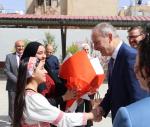You are here
US and Iran — a tacit alliance
Mar 09,2015 - Last updated at Mar 09,2015
Tehran’s moves in the region make clear its desire to help reshape the Middle East in a way that would catapult Iran to a prominent regional power.
Supreme Leader Ayatollah Ali Khamenei ensured that Iran’s influence in four Arab capitals is huge.
Iran’s ability to reshape the Middle East is in part helped by the hesitant leadership of US President Barack Obama.
For instance, at a time Obama is pressured by Republicans, as well as by some of his allies in the Middle East, to put an end to Iran’s nuclear programme, he is becoming increasingly reliant on Iran in the battle against the Daesh militants.
While Obama seems unwilling to put boots on the ground in either Iraq or Syria, Iran is willing to do the job, at least in Iraq.
Against this background, many wonder how Obama could rein in Iran’s nuclear ambitions when Iranian fighters are helping push back the Daesh militants in Iraq.
The American administration insists that it did not coordinate with Iran in the fight against a common enemy, but few would really believe it. The coordination does not have to be overt, it could be done through Iraqi intermediaries, particularly those who have a vested interest in getting Tehran’s support for sectarian ends.
Iranian forces are helping the Iraqi army hold on against militants, but at what price?
To the vexation of the American administration, Gen. Qassim Suleimani — accused by the Americans of having organised a deadly campaign against American forces in the past — is leading the Iranian forces in Iraq.
The picture showing him drinking tea on the frontline must have embarrassed the American leadership.
Is Iran doing this job just to help the United States with nothing in return?
As Vali Nasr, a professor at Johns Hopkins University said, “you can’t have your cake and eat it too — the US strategy in Iraq has been successful so far largely because of Iran”.
Indeed, some American officials are keen to see Iran getting involved in an overt job of ejecting Daesh.
Gen. Martin Dempsey appeared before the Senate Armed Services Committee last Tuesday and said that the participation of Iranian-backed Shiite militias in Tikrit was a positive step as long as it would not aggravate sectarian tension.
I think that Dempsey knows better than that.
The Iranian-backed Shiite groups have been serving Iran and have been the cause of sectarian tension for years. Shiite militias committed atrocities against the Sunni Arabs of Iraq and this trend continued unchecked.
And yet, one should examine the notion that Iran is adopting a realpolitik approach to the region.
The Iranians’ perception of the decline of the American influence in the region is what has been driving Iran over the last few years.
Key to Iran’s strategy of becoming a regional superpower is the development of its nuclear programme.
After years of defiance, it seems that Iranian leaders realise that the most expedient way to nuclear arms is through an agreement with the US. Iranian leaders hope that reaching an agreement with the US would mean one thing for them: lifting the crippling sanction regime.
It remains to be seen how the deal will be worked out. But for the time being, the American allies in the region have faith neither in Obama’s intentions nor in his judgement.
In fact, it is not only Iran’s nuclear programme that annoys some countries in the Middle East, but also Iranian expansionism.
When Secretary of State John Kerry visited Saudi Arabia to assure its leaders that his country would not let them down, the Saudi foreign minister, Prince Saud Al Faisal, made it perfectly clear that Iran’s role in Tikrit demonstrates Iran’s “hegemonic” tendencies.












